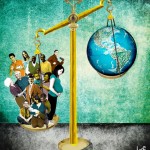 The United States is not a democracy and was never intended to be. Democracy means majority rule. The rights of each individual, however, regardless of race, sex, sexual orientation, color, class, or creed, are inalienable in the literal sense (i.e. cannot be transferred, revoked, or be made alien) and are thus never subject to vote or the “whims of the majority.”
The United States is not a democracy and was never intended to be. Democracy means majority rule. The rights of each individual, however, regardless of race, sex, sexual orientation, color, class, or creed, are inalienable in the literal sense (i.e. cannot be transferred, revoked, or be made alien) and are thus never subject to vote or the “whims of the majority.”
Which is why the word “democracy” does not appear one time in either the Constitution or the Declaration of Independence.
The United States is, as Benjamin Franklin said, a Constitutional Republic.
Calvin Coolidge had a pet pygmy hippo, which he kept in the White House.
Whereas Teddy Roosevelt kept a pet hyena.
Ronald Reagan was once given an honorary doctorate in professional football.
The largest scientific study ever conducted on acid rain (National Acid Precipitation Assessment Program, Integrated Assessment, External Review Draft) didn’t find any real evidence that acid rain destroys forests.
As a teaching method, the National Wildlife Federation routinely had students dump highly acidic water on plants to, quote, “simulate acid rain.” Thus, when the plants died, the kids naturally assumed that acid rain kills forests in this same manner.
In 1992, a man in Carson City, Nevada, ran in the Democratic primarily as, quote, “God Almighty!” And did not win.
Dichloro-diphenyl-trichloroethane (DDT) was invented to protect American troops in WWII from insect-borne disease.
Despite numerous studies, DDT has never once been shown to be harmful. On the contrary, it has saved more lives than any other chemical invention in the history of the world, with the possible exception of antibiotics.
One spraying of DDT lasts longer than all other pesticides combined. Which is one of the many reasons mosquitoes are less resistant to it.
Since DDT was banned, more pesticides are now required, because none are as effective as DDT.
Which is one of the biggest reasons malaria has come back with such a vengeance.
During the final rush to get the first shipment of DDT out the door to American Troops, a valve at the bottom of a large vessel of DDT accidentally came open. Chemist Joseph Jacobs, who was standing under the vessel when it opened, was covered with hot DDT. “When it dried,” he says, in his autobiography, The Anatomy of an Entrepreneur, “I had DDT an inch thick all over me. In my hair, in my ears, and in my mouth and nose. I took off my clothes, showered, and scrubbed, but probably ingested more DDT during that one incident than is today considered safe to absorb over many years.”
Rachel Carson, author of Silent Spring, which singlehandedly succeeded in getting DDT banned, believed that one touch of DDT could kill you.
Chemist Joseph Jacobs lived another sixty years with no adverse health effects whatsoever.
Joseph Jacobs routinely lectured on the utter safety of DDT. In fact, he began each lecture by eating a spoonful of raw DDT at the podium.
He was awarded the Nobel Prize for his DDT work and was eighty-eight when he died, in 2004.
“In all the previous wars of history,” wrote chemical engineer O.T. Zimmerman, in 1946, “the louse [singular for lice] has killed more men than ever died from bullets, swords, or other weapons.”
The Audubon Society, though sympathetic to Rachel Carson’s claims, has stated publicly that no extinction or significant loss to bird populations came about through the use of DDT: “of the 40 birds Carson said might by now be extinct or nearly so, 19 have stable populations, 14 have increasing populations, and 7 are declining” (Easterbrook, 1995, p. 82). It should be noted furthermore that the 7 listed as “declining” declined only slightly, and not through any demonstrable link with DDT.
After President Bush senior banned broccoli from the White House in 1990, California broccoli growers delivered nine tons of it to Washington DC.
Science is in large part government-funded. Thus, scientists improve their access to research money if they can show politicians that they are “saving the planet.”
Statistically speaking, scientists who don’t propagate the fear-factor receive far less money than those who do, regardless of the actual truth.
Melvin Shapiro, for instance, head of research at the National Oceanic and Atmospheric Administration, told Insight Magazine: “If there were no dollars attached to the game, you’d see it played on intellect and integrity. When you say the ozone threat is a scam, you’re not only attacking people’s scientific integrity, you’re going after their pocketbook as well.”
After that interview, Shapiro stopped taking phone calls. Word circulated that his supervisors censored him for fear of hurting their own funding.
Bureaucrats realize this as well: “When the Superfund Law was passed in 1980 … the EPA’s budget went up almost instantly by hundreds of millions of dollars, and ultimately billions…. The EPA administrator actively campaigned for the Superfund Law…. And, in fact, the law that emerged was largely written by members of the agency” (Facts Not Fear, p. 8).
The Superfund Law has achieved next to nothing — apart, that is, from spending billions in taxpayer dollars.
George Washington carried a sundial instead of a watch to tell time.
More timber grows each year than is cut.
“In the time it takes you to read this letter, nine hundred acres of rainforest will have been destroyed forever,” said Russell E. Train, of the World Wildlife Fund & The Conservation Foundation, back in 1992, a complete fiction, we now know.
The famous statement made by biologist Norman Myers, which sent environmentalists everywhere scurrying to their soapboxes, that “2 percent of all tropical forest was being destroyed per year,” and that by “2000 we will have lost a third of the world’s tropical forest” (Myers cited in Goudie 1993:46.), has proved inanely inaccurate.
The Food and Agriculture Organization (FAO) puts tropical deforestation in the 1980s at 0.8 percent. In 2001, satellite imagery, which is precise, shows that tropical deforestation had declined to 0.46 percent.
Lack of property rights — i.e. private property — makes tropical deforestation worse.
The snows of Kilimanjaro, one of Al Gore’s pet props, have been receding for a very long time, a well-known fact among scientists, who, additionally, are also quick to note that the temperature on Kilimanjaro has not been going up. Why, then, the recession of Kilimanjaro’s snows? Ice requires cold and moisture. And it’s precisely the latter that’s lacking.
As climate scientist Robert Balling says: “Gore does not acknowledge the two major articles on the subject published in 2004 in the International Journal of Climatology and the Journal of Geophysical Research showing that modern glacier retreat on Kilimanjaro was initiated by a reduction in precipitation at the end of the nineteenth century and not by local or global warming.”
I.e. the local climate shift on Kilimanjaro began a century ago.
About a decade ago, Doctor R.J. Braithwaite wrote an article that appeared in Progress in Physical Geography.
In that article, which was peer-reviewed, Doctor Braithwaite tells us how he analyzed 246 glaciers, sampled from both hemispheres and latitudes, between the years 1946 and 1995. This “mass balance analysis” he conducted found that “some glaciers were melting, while a nearly equal number were growing in size, and still others remained stable.” Doctor Braithwaite’s unequivocal conclusion:
“There is no obvious common or global trend of increasing glacier melt in recent years.”
“By some estimates, 160,000 glaciers exist on Earth. Only 63,000 have been inventoried, and only a few hundred have been studied in the detail described by Braithwaite” (“It Would Be Nice to Know More about Ice,” Jay Lehr).
On the basis of that logical fallacy known as the fallacy of insufficient evidence, all glacier fears are stopped cold right there.
But in fact that’s only the tip of the iceberg.
Keith Echelmeyer, a glaciologist at the University of Alaska’s Geophysical Institute, says this:
“To make a case that glaciers are retreating, and that the problem is global warming, is very hard to do… The physics are very complex. There is much more involved than just the climate response.”
Mr. Echelmeyer goes on to tell us that in Alaska there are large glaciers advancing in the very same areas where others are retreating.
Quoting Doctor Martin Beniston of the Institute of Geography at the University of Fribourg, Switzerland:
Numerous climatological details of mountains are overlooked by the climate models, which thus makes it difficult to estimate the exact response of glaciers to global warming, because glacier dynamics are influenced by numerous factors other than climate, even though temperature and cloudiness may be the dominant controlling factors. According to the size, exposure and altitude of glaciers, different response times can be expected for the same climatic forcing.
According to the excellent glacier program at Rice University, those response times run something like this:
Ice sheet: 100,000 to 10,000 years
Large valley glacier: 10,000 to 1,000 years
Small valley glacier: 1,000 to 100 years
“Glaciers are influenced by a variety of local and regional natural phenomena that scientists do not fully comprehend. Besides temperature changes, glaciers also respond to changes in the amount and type of precipitation, changes in sea level and changes in ocean circulation patterns. As a result, glaciers do not necessarily advance during colder weather and retreat during warmer weather” (John Carlisle, National Center for Public Policy).
Grist magazine: There’s a lot of debate right now over the best way to communicate about global warming and get people motivated. Do you scare people or give them hope? What’s the right mix?
Al Gore: I think the answer to that depends on where your audience’s head is. In the United States of America, unfortunately we still live in a bubble of unreality. And the Category 5 denial is an enormous obstacle to any discussion of solutions. Nobody is interested in solutions if they don’t think there’s a problem. Given that starting point, I believe it is appropriate to have an over-representation of factual presentations on how dangerous it is, as a predicate for opening up the audience to listen to what the solutions are, and how hopeful it is that we are going to solve this crisis. Over time that mix will change. As the country comes to more accept the reality of the crisis, there’s going to be much more receptivity to a full-blown discussion of the solutions. (Source of this astonishing exchange: Grist Magazine[boldface mine].)
John Quincy Adams (1767-1848) was a foreign diplomat at age 14.
Teddy Roosevelt once delivered a one-hour speech, despite the fact that he had just been shot by a would-be assassin.
Quondam senator Barry Goldwater recommended peanut butter for shaving cream.
The tenth President of the United States, John Tyler (1790-1862), was unable to get a job after leaving office and so worked at a village pound tending cows and horses.
All the trash produced by the United States for the next one thousand years could fit into a landfill forty-four miles square by 120 feet deep—one tenth of 1 percent of all this country’s entire land area. (“A Consumer’s Guide to Environmental Myths and Realities,” Policy Report #99, National Center for Policy Analysis, Dallas, TX, September 1991, 3, quoting Clark Wiseman of Gonzaga University.)
“It is entirely possible that we may be the last generation of humans to know this wondrous earth as it was meant to be,” said the Sierra Club Legal Defense Fund, many years ago.
“Nearly every habitat is at risk,” said Time Magazine, almost two decades ago. “Swarms of people are running out of food and space …” Which is another statement that time and the facts have exposed as completely false. Thus:
Every man, woman, and child on the planet could fit shoulder-to-shoulder in a space no bigger than Jacksonville, Florida.
Article 1, Section 8, of the Constitution says Congress has only these powers. To borrow money (not the same thing as taxation); regulate commerce with foreign nations; establish rules for naturalization; coin money and fix standards of weights and measures; punish counterfeiting; establish a post office; promote science with patents; establish the lower courts; punish pirates; declare war; raise and support armies, but only for a term of two years; provide a navy; regulate naval and land forces; call forth the militia; and administer capital.
“It would be impossible to construct a logical argument that these powers permit the massive welfare state and regulatory state that exists today in America,” said Doctor Thomas Dilorenzo, in 2006.
“The United States is not a Christian Nation,” said President John Adams, in the Treaty of Tripoli.
“Private property is the guardian of every other right” said James Madison, the father of the Constitution.
“I precisely advocate the abolition of private property,” said Karl Marx.
“Capitalism is a social system based on the recognition of individual rights, including property rights, in which all property is privately owned,” said Ludwig von Mises.
“The only alternative to private property is government ownership — that is, socialism,” says Doctor Dilorenzo.
Peter Cooper, inventor of a gelatinous dessert called Jell-O, once ran for the Presidency of the United States.
And lost.









